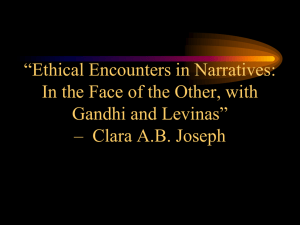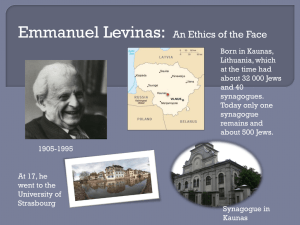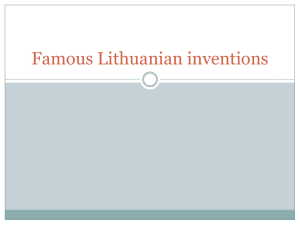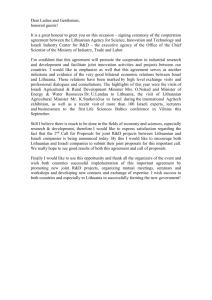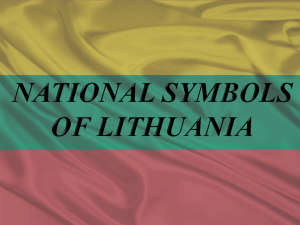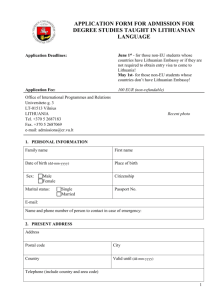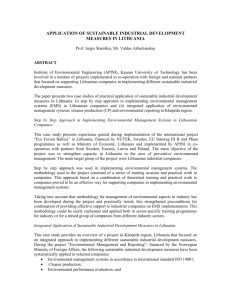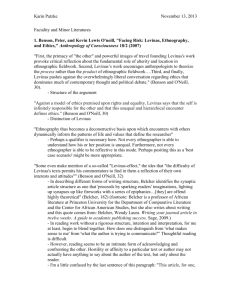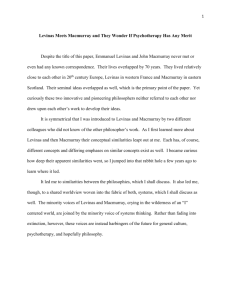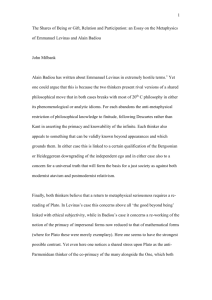My Discovery of Emmanuel Levinas
advertisement
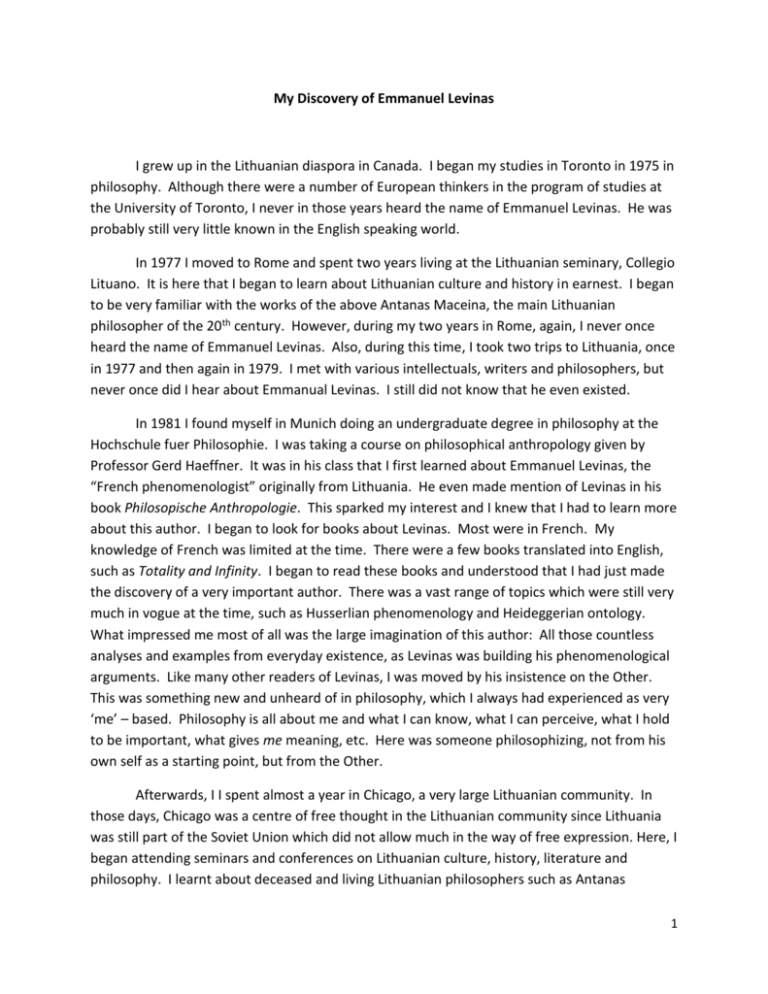
My Discovery of Emmanuel Levinas I grew up in the Lithuanian diaspora in Canada. I began my studies in Toronto in 1975 in philosophy. Although there were a number of European thinkers in the program of studies at the University of Toronto, I never in those years heard the name of Emmanuel Levinas. He was probably still very little known in the English speaking world. In 1977 I moved to Rome and spent two years living at the Lithuanian seminary, Collegio Lituano. It is here that I began to learn about Lithuanian culture and history in earnest. I began to be very familiar with the works of the above Antanas Maceina, the main Lithuanian philosopher of the 20th century. However, during my two years in Rome, again, I never once heard the name of Emmanuel Levinas. Also, during this time, I took two trips to Lithuania, once in 1977 and then again in 1979. I met with various intellectuals, writers and philosophers, but never once did I hear about Emmanual Levinas. I still did not know that he even existed. In 1981 I found myself in Munich doing an undergraduate degree in philosophy at the Hochschule fuer Philosophie. I was taking a course on philosophical anthropology given by Professor Gerd Haeffner. It was in his class that I first learned about Emmanuel Levinas, the “French phenomenologist” originally from Lithuania. He even made mention of Levinas in his book Philosopische Anthropologie. This sparked my interest and I knew that I had to learn more about this author. I began to look for books about Levinas. Most were in French. My knowledge of French was limited at the time. There were a few books translated into English, such as Totality and Infinity. I began to read these books and understood that I had just made the discovery of a very important author. There was a vast range of topics which were still very much in vogue at the time, such as Husserlian phenomenology and Heideggerian ontology. What impressed me most of all was the large imagination of this author: All those countless analyses and examples from everyday existence, as Levinas was building his phenomenological arguments. Like many other readers of Levinas, I was moved by his insistence on the Other. This was something new and unheard of in philosophy, which I always had experienced as very ‘me’ – based. Philosophy is all about me and what I can know, what I can perceive, what I hold to be important, what gives me meaning, etc. Here was someone philosophizing, not from his own self as a starting point, but from the Other. Afterwards, I I spent almost a year in Chicago, a very large Lithuanian community. In those days, Chicago was a centre of free thought in the Lithuanian community since Lithuania was still part of the Soviet Union which did not allow much in the way of free expression. Here, I began attending seminars and conferences on Lithuanian culture, history, literature and philosophy. I learnt about deceased and living Lithuanian philosophers such as Antanas 1 Maceina, as mentioned, and Juozas Girnius. Never did I ever hear the name of Emmanuel Levinas. Nevertheless, I carried on with my reading of Levinas, always trying to learn more about this enigmatic figure. In the fall of 1983 I was back in Canada and enrolled in a Master’s program in philosophy at McGill University in Montreal. I decided that the philosophy of Emmanuel Levinas would be the subject of my thesis. The philosophy department at McGill was mostly composed of analytical philosophers, so there was no great enthusiasm for this project, but I was allowed to continue, provided that I could find a professor willing to become my director. Professor Charles Taylor from the Political Science department kindly accepted. Within two years my thesis was written and my master’s degree was completed. This thesis eventually become my book From the Other to the Totally Other, published by Peter Lang Publishing House in New York. It was during this time at McGill University that I was able to really deepen my knowledge of Levinas and it was also during this time that I made his acquaintance. As I have alluded to, there was not great support for Levinas at the time at McGill. However, several years ago a major international conference on Levinas took place at McGill under the auspices of the Faculty of Law, of all places. Being at McGill, I began to try and find Levinas’ address, in the days before the Internet. Once I had it, I wrote to him in Lithuanian and sent the letter off to Paris. I did not know whether or not I would get a reply, I did not know whether or not he would understand it. I just thought that this would be the ultimate test, is he really Lithuanian or not? To my delight, Levinas responded in perfect Lithuanian. It was obvious that this was the first Lithuanian language letter that he had received in decades. He had not been to Lithuania in 45 years, and yet his mastery was perfect and he obviously had understood everything that I had written. This was amazing and it shocked many people later on, who had no notion that Levinas knew Lithuanian. After this initial contact by letter, I was able to meet Emmanuel Levinas for the first time in Ottawa in 1983. The University of Ottawa was hosting a conference on Paul Ricoeur with Paul Ricoeur himself in attendance. Professor Ricoeur “brought along,” as he himself said, his good friend Emmanuel Levinas. Professor Levinas gavea lecture. I was impressed how, during his lecture, he did not read off pages of a clean, type written text, as is usual in conferences, but held a hand-written manuscript of blue, thick ink from a fountain pen and from which he read. Afterwards, he invited me to his hotel room the next day, so that we could talk together. It was here at his hotel, that I had a ‘face to face’ conversation with Emmanuel Levinas and told him that I was working on a master’s thesis about his philosophy. His first reaction was to dissuade me. He told me that it would be much more beneficial for my education and all2 round general philosophical culture to write a thesis on one of the classics of philosophy, such as Kant. He insisted that I would learn much more through this kind of a process. I insisted that I wanted to write my thesis on his thought. In reality, I knew that he was probably right, but I was proud of Levinas as being from the country of my parents and my ancestors, from Lithuania, and it is he whom I wanted to make known in the English speaking world. He was only really known in France at the time. In Lithuania, he was hardly known at all, no one seemed to be taking an interest in him. Nevertheless, I thought that this was a sign of true humility when he tried to encourage me to work on a classic author. What was my first impression of Professor Levinas? The first thing that struck me was that he was a very serene man. Rather amazing for someone who had been in a concentration camp. No nervous twitches, no bitterness. He had to be about 75 years-old at the time, but he came across to be a man in good health, strong and energetic. There was also something very kind about him. It was during this first meeting that he told me that he had once published an article in Lithuanian, but that he could no longer find any trace of it and did not remember the name of journal in which it appeared. This story I have told in the Continental Philosophy Review (vol. 31, no.1, January 1998). It took me ten years of searching to find the article. I began by way of the inter-library loans requests, letters to booksellers and collectors, everywhere I could think of checking. I finally found the name of the journal, Vairas, but it was impossible to locate. Then, one day, while on a trip to Lithuania in 1994, I just walked into the reading room of the University of Vilnius and glanced at a shelf containing pre-war Lithuanian journals and there it was, right before me, a 1933 edition of the journal Vairas. How extraordinary! It had been sitting there on the shelf for over 60 years. It had survived World War II, the Nazi occupation and the Soviet occupation. I am sure that no one had even touched it for years, but it is also amazing that the journal was not just taken off the shelf. My subsequent translation of this article into English and my Afterward then proved to the world that Emmanuel Levinas was indeed a Lithuanian philosopher in his deepest roots, before being a French philosopher. The second time that I met Emmanuel Levinas was a few years later at his apartment in Paris, near the Bois de Boulogne. I remember walking up the stairway in his building and being met at the door by his wife. She asked me in and then called for her husband. She quickly disappeared into another room, only to emerge later with coffee and pastries. She seemed to be a very discreet woman with very kind eyes. This time again, we talked about his life and work. I was a little shocked by the modesty of his living quarters, being used to seeing North American professors live in large suburban homes. I saw an old desk, not very big, in the corner of the room and asked whether it was here that he wrote his books, and he told me, yes. It was pretty amazing. Immediately, I felt a lot of sympathy for this great man. 3 During that second meeting, I was asking Professor Levinas various technical questions about his work, since by now I was fairly advanced in my reading. He helped me along, making suggestions. He told me of his indebtedness to the Russian classics, especially Dostoievsky. This theme I have written about in my book, From the Other to the Totally Other, and also following my English translation of the Lithuanian article in the Continental Philosophy Review. Thus, why the long period of completely ignoring the work of Emmanuel Levinas in Lithuania? I am afraid that the answer to this question has to do with prejudice and ignorance. From a Lithuanian perspective, he was never considered to be Lithuanian, but Jewish. In prewar Lithuania, being Jewish was understood as being part of another nationality. The pre-war Lithuanian passport read, citizenship – Lithuania, nationality – Jewish, if I am not mistaken. In the sway of a strong nationalist and Catholic, Lithuanian, culture which began, like in many countries in Europe, at the end of the 19th century and lasted practically until the break-up of the Soviet Union, Jewish-Lithuanian history did not really interest anyone in Lithuania. This is very sad. Imagine German culture ignoring Sigmund Freud, because he was Jewish. It is also very odd that Jewish culture was so long ignored, considering how important it was for Lithuania. The Jewish people have a long history in Lithuania, dating back to medieval times. Grand Duke Vytautas invited Jews to Lithuania in the 14 th century in order to develop banking and commerce in his kingdom and he conferred upon them the same status as upon noblemen. The Lithuanian Jews then forged their own style of Judaism, one producing many great scholars such as Solomon Maimon, a contemporary of Kant and also, the great Talmud scholar known as the Gaon of Vilnius. This was a very learned and progressive form of Judaism. It is this rich tradition which also gave us Emmanuel Levinas, if one may say so. But, unfortunately, rather than this tradition forming a proud part of Lithuanian history and culture, it was basically ignored by mainstream Lithuanian thinkers. I remember once, in Chicago, in the 1980s, I was present at a Lithuanian cultural event and was approached by a person there present who asked me why I was spending my time writing about Jews, when there are so many Lithuanian thinkers about whom one should write. I could not believe what I was hearing. However, to do justice to the country of Lithuania and its people, I should also add that part of the ignorance towards Jewish culture and history in Lithuania came from the Soviet system. Lithuania was part of the Soviet Union for almost 50 years, from 1944 to the break-up in 1991. During this time, everything that had to do with any kind of religious culture, be it Catholic, Orthodox, Jewish or Muslim, was simply obliterated from the cultural landscape and even persecuted. This set progress back many years in these countries. Fortunately, times have changed. Today, in Lithuania itself and in Lithuanian circles abroad, there is an interest in Jewish Lithuanian culture. There is a Jewish museum in Vilnius. 4 In 2006, the University of Vilnius hosted an international conference on Emmanuel Levinas. There is pride in the fact that Emmanuel Levinas comes from Lithuania and there is a renewed interest in Jewish philosophers and Jewish scholarship. If, by my discovery and translation of the Lithuanian text of Levinas, I have helped in breaking down prejudices and bringing people together and have helped in making Levinas better known, in and outside of Lithuania, then I am very happy. Andrius Valevicius 5
